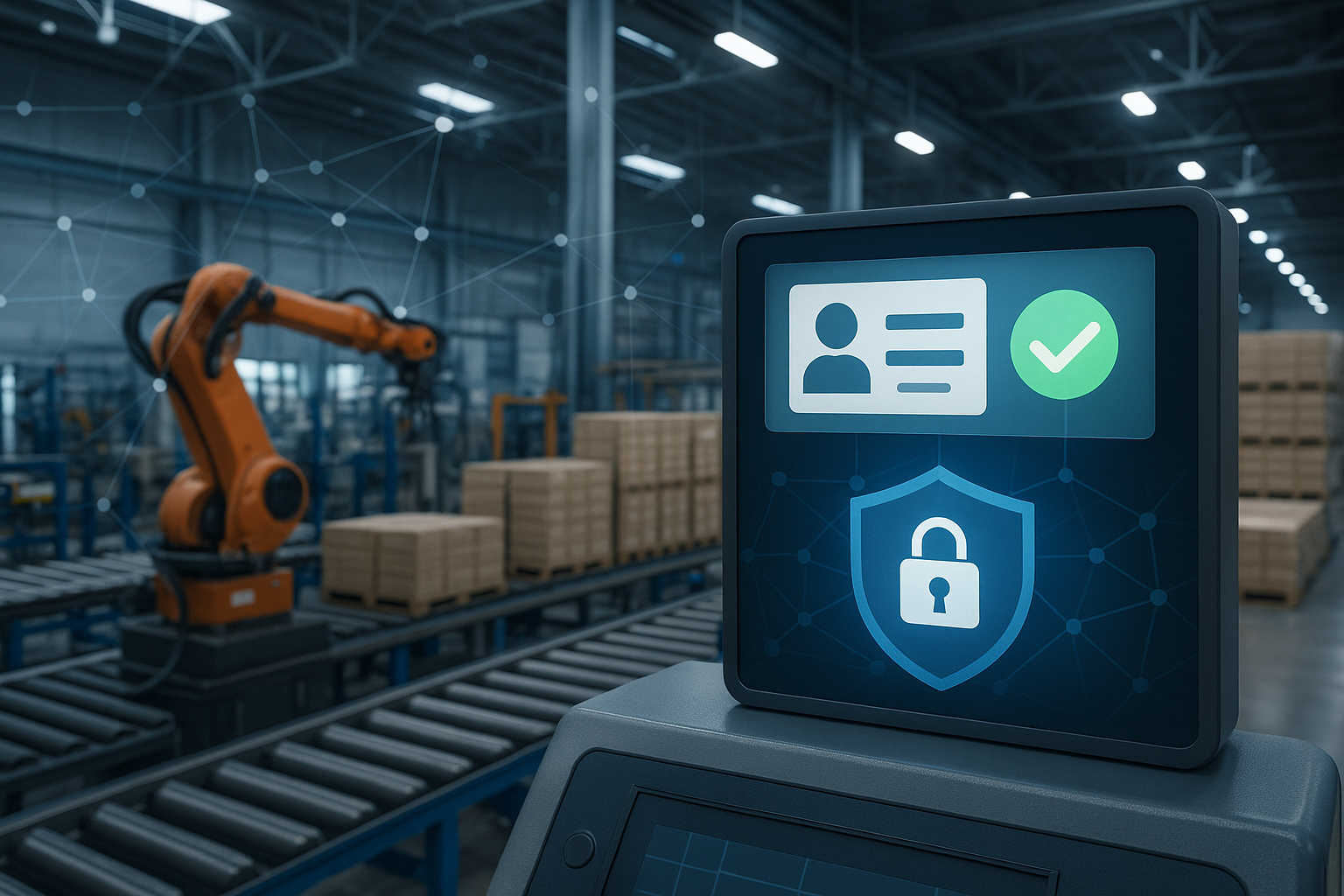Verifiable Credentials in Manufacturing are transforming how enterprises safeguard their supply chains against growing risks. Manufacturing enterprises in the US operate within complex global supply chains where trust and security are constantly under threat.
According to recent Gartner and industry data, nearly two-thirds (61%) of U.S. businesses were directly impacted by software supply chain attacks between April 2022 and April 2023, highlighting the widespread nature of these risks.
From counterfeit parts entering production lines to compliance documents that are difficult to validate, the risks of supplier fraud and poor traceability can translate into costly recalls, regulatory penalties, and damaged brand reputation.
In this environment, building a system of trusted identity and verifiable credentials in manufacturing is no longer optional, it is essential. By moving beyond paper-based audits and siloed records, manufacturers can create a secure digital trust framework that strengthens supplier relationships and ensures compliance at scale.
This blog explores how digital credentials directly address the industry’s most pressing challenges, the benefits for supply chain heads and compliance officers, and why they represent the future of manufacturing security.
What are Verifiable Credentials in Manufacturing?
Verifiable credentials in manufacturing are secure, tamper-proof digital records that validate the identity, qualifications, and compliance of suppliers, employees, or products. Unlike traditional certificates or audit reports that can be forged or delayed, these credentials use advanced encryption and decentralized technology to guarantee authenticity in real time.
At their core, digital credentials function as trusted identity solutions across the supply chain. For example, a supplier can issue a verifiable credential that proves a component meets safety standards. When a manufacturer receives the shipment, the credential can be instantly checked against a secure ledger removing uncertainty and reducing reliance on manual validation.
The difference from conventional methods is clear: instead of chasing paperwork, manufacturing enterprises gain immediate, reliable, and scalable verification. This shift not only cuts fraud risk but also builds confidence across global supply networks.
Why Manufacturing Faces Trust & Security Issues
The manufacturing sector is built on a delicate balance of suppliers, distributors, regulators, and customers. When trust is compromised at any point, the entire chain is at risk. Two challenges dominate this landscape: supplier fraud and poor traceability.
1. Supplier Fraud
Counterfeit parts, falsified compliance certificates, and misleading supplier claims are costly problems. For instance, aerospace and automotive manufacturers often face risks where a single fake component can disrupt production, cause safety issues, or trigger recalls worth millions. Paper-based audits and manual checks are simply not fast or reliable enough to prevent these risks in today’s complex global networks.
2. Poor Traceability
Modern supply chains often span multiple geographies, making it difficult to track the origin and movement of components. If a defective part surfaces, manufacturers must trace it back quickly, yet fragmented systems and siloed records slow down investigations. The result: longer downtime, regulatory penalties, and reputational harm.
Beyond these two pain points, manufacturers must also navigate increasing compliance requirements in the US and abroad. Traditional validation methods struggle to meet these demands efficiently, leaving compliance officers under constant pressure.
Without a system for trusted identity and verifiable credentials, manufacturers remain vulnerable to fraud, inefficiencies, and security breaches. This creates a clear need for digital solutions that secure every link in the supply chain.
How Digital Credentials Solve These Challenges
Digital credentials provide a secure, scalable way to establish trusted identity across the manufacturing ecosystem. By converting compliance proofs, supplier certificates, and workforce qualifications into verifiable credentials, manufacturers gain real-time assurance that every document and identity in the supply chain is authentic. This addresses both supplier fraud and poor traceability head-on.
1. Preventing Supplier Fraud
Each supplier can issue a verifiable credential tied to their legal identity and compliance status. When a component arrives at the manufacturer, the credential can be instantly validated against a secure, tamper-proof system. This makes it nearly impossible for counterfeiters to pass off fake parts or falsified compliance certificates.
2. Improving Traceability
Digital credentials create a chain of trust by attaching verified records to every transaction, part, or material. This means a compliance officer or supply chain head can track an item’s origin, its movement through different suppliers, and its final use in production, all in real time. If an issue arises, defective parts can be traced back immediately, minimizing disruptions and recalls.
3. Enforcing Compliance Efficiently
With traditional audits, proving compliance involves chasing paperwork and coordinating across fragmented systems. Digital credentials eliminate this friction. Standards, licenses, and certifications are issued in a verifiable format, allowing manufacturers to validate them instantly during audits or inspections.
Example: An automotive manufacturer in the US could require all tier-2 suppliers to provide digital credentials for ISO certifications. Before production begins, compliance teams can verify these credentials instantly, ensuring only trusted suppliers enter the chain.
By embedding credential solutions into everyday operations, manufacturers strengthen supply chain security, reduce fraud risk, and create a transparent ecosystem where every stakeholder is accountable.
Benefits for Supply Chain Heads & Compliance Teams
For manufacturing enterprises, the promise of verifiable credentials is not just about technology, it’s about solving day-to-day operational and compliance headaches. Supply chain heads and compliance officers, in particular, stand to gain the most from this transformation.
1. Reduced Risk Exposure
By ensuring that every supplier, employee, and part is backed by a trusted identity, organizations minimize the chance of counterfeit goods or non-compliant partners slipping into the system. This proactive defense reduces exposure to recalls, penalties, and reputational damage.
2. Faster Audits & Reporting
Instead of chasing documents across departments and geographies, compliance teams can validate credentials instantly. Whether it’s proving adherence to OSHA standards, ISO certifications, or cross-border trade regulations, digital credentials accelerate audit readiness and cut administrative burden.
3. Trusted Supplier Ecosystem
With credential solutions in place, manufacturers build a reliable supplier network where every partner’s identity and compliance status is verified upfront. This fosters long-term trust, improves vendor relationships, and simplifies onboarding of new partners.
4. Operational Efficiency & Cost Savings
Manual validation and paper-based compliance checks consume significant time and resources. Automating these processes through verifiable credentials reduces delays, eliminates redundancies, and lowers administrative costs allowing teams to focus on strategy rather than paperwork.
For US-based manufacturers competing globally, these benefits translate into a significant competitive edge. By adopting verifiable credentials, supply chain heads and compliance officers gain the assurance that their operations are secure, efficient, and future-ready.
Use Cases of Verifiable Credentials in Manufacturing
The real power of verifiable credentials in manufacturing lies in how they can be applied across multiple operational touchpoints. From supplier onboarding to workforce compliance, digital credentials bring trust and efficiency into processes that were once manual and error-prone.
1. Supplier Onboarding & Vendor Management
When manufacturers onboard new suppliers, credentials such as business licenses, quality certifications, and compliance records can be issued and verified instantly. This reduces onboarding timelines and ensures only trusted identity partners enter the supply chain.
2. Workforce Certifications & Safety Compliance
Plant workers often require certifications for handling equipment, hazardous materials, or safety protocols. Digital credentials allow HR and compliance teams to validate workforce qualifications in real time, ensuring that only trained employees operate in critical environments.
3. Equipment Maintenance & Part Authenticity
Every piece of machinery or component can carry a digital credential proving authenticity, maintenance history, and warranty status. This prevents counterfeit parts from entering production lines and provides full traceability throughout the equipment lifecycle.
4. Cross-Border Compliance
For US manufacturers importing parts globally, ensuring compliance with international trade and safety regulations is a major challenge. With verifiable credentials, compliance documents can be validated instantly, removing friction in customs processes and reducing the risk of penalties.
Example: An aerospace manufacturer could maintain a digital credential for each engine component, covering its origin, safety checks, and certifications. This makes audits faster and ensures regulatory bodies can verify compliance without delays.
By embedding digital credentials into these scenarios, manufacturers create a secure, transparent, and efficient ecosystem that improves operations while protecting against fraud and inefficiencies.
Future of Verifiable Credentials in Manufacturing
The adoption of digital credential solutions in manufacturing is still in its early stages, but the momentum is accelerating. As supply chains become more global and compliance requirements in the US continue to expand, manufacturers will increasingly rely on verifiable credentials to secure operations and maintain trust.
Integration with Emerging Technologies
- Blockchain will strengthen the immutability of credentials, ensuring that once a supplier or component is verified, the record cannot be altered.
- IoT-enabled devices can issue credentials automatically, for example, a machine could log its own maintenance history into a verifiable credential.
- AI-driven analytics will help compliance teams detect anomalies or risks by analyzing credential data across suppliers and partners.
Shifting Compliance Landscape
Regulatory bodies in the US and abroad are already pushing toward more transparent, verifiable systems of record. Manufacturers that adopt digital credentials early will be better prepared to meet these evolving compliance expectations while staying ahead of competitors still reliant on paper and manual processes.
Building a Trusted Digital Identity Ecosystem
The long-term vision is an interconnected manufacturing ecosystem where every supplier, product, and worker is tied to a trusted identity. This will not only reduce fraud and inefficiencies but also enable a future where collaboration across global supply chains is seamless and secure.
The message is clear: digital credentials are not just a tool for solving today’s trust and security challenges, they are the foundation of tomorrow’s manufacturing standards.
Final Thoughts!
Manufacturing supply chains can no longer rely on outdated validation methods to manage fraud, compliance, and traceability. Verifiable credentials in manufacturing provide a secure, scalable way to establish trust across suppliers, workers, and components, strengthening identity assurance while simplifying compliance.
For supply chain heads and compliance teams, the advantages are clear: faster audits, stronger supplier relationships, and reduced exposure to costly risks. As the industry moves toward a future shaped by blockchain, IoT, and evolving regulations, digital credentials will define how manufacturers build trust in a connected world.
If your enterprise is ready to eliminate supplier fraud and improve compliance, now is the time to explore digital credential solutions.
Fill the inquiry form to see how trusted identity can transform your manufacturing operations.

 25th August, 2025
25th August, 2025 



